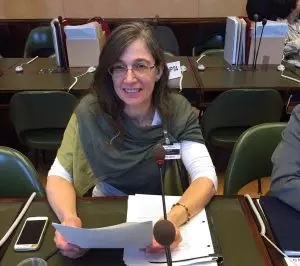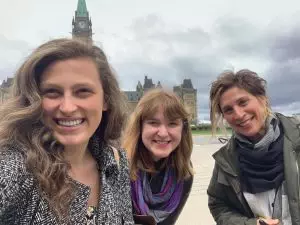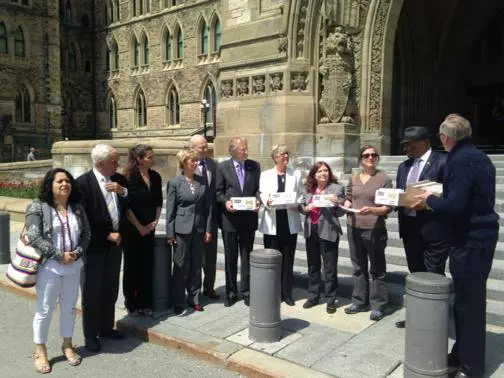
2021
National Advisory Council on Poverty
2020
The House of Commons Standing Committee on Procedure and House Affairs
2016
Standing Committee on Human Resources, Skills and Social Development and the Status of Persons with Disabilities (HUMA)
Standing Committee on Justice and Human Rights
 On the 40th anniversary of Canada ratifying the International Covenant on Economic, Social and Cultural Rights and the International Covenant on Civil and Political Rights, CWP presented to the Standing Committee on Justice and Human Rights. CWP’s presentation focused on the future of the Court Challenges Program of Canada (CCPC) and access to justice for people living in poverty. The presentation provided an overview of the entrenched stigma associated with living in poverty that is often internalized and can result in a fear of reprisal or further prejudice, particularly when individuals try to claim their legal rights, and the way in which the CCPC can be used as a mechanism for Canada to realize its human rights obligations.
On the 40th anniversary of Canada ratifying the International Covenant on Economic, Social and Cultural Rights and the International Covenant on Civil and Political Rights, CWP presented to the Standing Committee on Justice and Human Rights. CWP’s presentation focused on the future of the Court Challenges Program of Canada (CCPC) and access to justice for people living in poverty. The presentation provided an overview of the entrenched stigma associated with living in poverty that is often internalized and can result in a fear of reprisal or further prejudice, particularly when individuals try to claim their legal rights, and the way in which the CCPC can be used as a mechanism for Canada to realize its human rights obligations.
2015
All Party Anti Poverty Caucus
 As part of the Dignity for All campaign, CWP presented the All Party Anti Poverty Caucus with thousands of postcards collected from across Canada that call for a national anti-poverty plan. The Caucus, composed of Conservative, Liberal, and New Democratic parliamentarians, presented the postcards to then Prime Minister Harper. The postcards were gathered as part of the International Day for the Eradication of Poverty (October 17) in collaboration with 45 communities from coast to coast and CWP’s partner in the Dignity for All campaign, Citizens for Public Justice. The postcards were signed as part of an activity known as ChewonThis! which raises awareness about food insecurity and poverty in Canada.
As part of the Dignity for All campaign, CWP presented the All Party Anti Poverty Caucus with thousands of postcards collected from across Canada that call for a national anti-poverty plan. The Caucus, composed of Conservative, Liberal, and New Democratic parliamentarians, presented the postcards to then Prime Minister Harper. The postcards were gathered as part of the International Day for the Eradication of Poverty (October 17) in collaboration with 45 communities from coast to coast and CWP’s partner in the Dignity for All campaign, Citizens for Public Justice. The postcards were signed as part of an activity known as ChewonThis! which raises awareness about food insecurity and poverty in Canada.
CWP continues to work with and present to the All Party Anti Poverty Caucus to this day.
Liberal Senate Caucus
2014
Standing Committee on the Status of Women
CWP has presented to the Standing Committee on the Status of Women several times. The President of the Board of Directors, Harriett McLachlan presented to the Committee in November 2014 on the topic of women’s leadership and economic prosperity. She spoke of her personal struggles as a woman and mother to be financially stable while living in poverty for many years and trying to establish a career. She also noted that her experience of poverty as a woman is not unique and called on the federal government to enact a national anti-poverty plan that is in accordance with the regulations set out in the ICESCR. Specifically, her speech highlighted the importance of developing a housing strategy as a necessary part of the process.
Two members of the Board of Directors, Laura Cattari and Brenda Thompson, presented to the Committee in May 2014 on economic prosperity issues. Both women have lived experiences of poverty that they shared with the Committee members. They identified the need for safe and affordable housing for all women, using a national plan. Ms. Cattari recommended the expansion of the Opportunities Fund for People with Disabilities (and other similar programs) to allow for part time workers to qualify. Ms. Thompson recommended a national childcare strategy that would make childcare affordable and accessible to everyone, regardless of circumstance.

Standing Committee on Procedure and House Affairs
CWP spoke out against the Fair Elections Act (Bill C 23), particularly concerned about the possibility of eliminating vouch voting and curtailing Election Canada’s ability to educate the Canadian public about elections in a non-partisan way. The vouch voting system was designed to help disadvantaged people who may not have access to government identification for any number of reasons, and did not result in voter fraud, as was suggested by its critics. It is indisputable that voter turnout in Canada is poor; the vouch voting system is but one way in which participation could be improved. Further, limiting Elections Canada’s abilities to enact public education campaigns about upcoming elections was concerning for Canada’s disadvantaged ground, for similar reasons to vouch voting.
